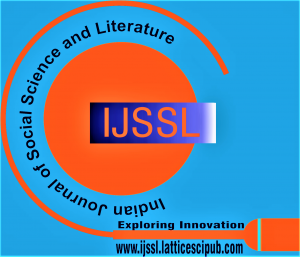![]()
Metaphysical Horizon in Wanda Dynowska’s Indian Poems
Marta Tiutiunnyk
Marta Tiutiunnyk, Faculty of Humanities and Social Sciences, University of Bielsko Biala, Śląskie, Poland.
Manuscript received on 25 March 2024 | Revised Manuscript received on 23 April 2023 | Manuscript Accepted on 15 June 2024 | Manuscript published on 30 June 2024 | PP: 1-6 | Volume-3 Issue-4, June 2024 | Retrieval Number: 100.1/ijssl.D112303040624 | DOI: 10.54105/ijssl.D1123.03040424
Open Access | Ethics and Policies | Cite | Zenodo | OJS | Indexing and Abstracting
© The Authors. Published by Lattice Science Publication (LSP). This is an open-access article under the CC-BY-NC-ND license (http://creativecommons.org/licenses/by-nc-nd/4.0/)
Abstract: The article concerns the works of literature published by the Polish poet Wanda Dynowska (1888-1971). The sacred theme, which is ubiquitous in her works, will be analysed and interpreted. As a writer, translator, social activist, and promoter of Indian, Polish, and Tibetan cultures, Dynowska was an extraordinary woman. She does not belong to the group of the most outstanding Polish poets, such as Wisława Szymborska, Czesław Miłosz, or Zbigniew Herbert; yet, her poetry is unique due to the subject matter that is hardly found in Polish literature and the empirical sources of her work. Moreover, Dynowska arrived in India in 1935. The experience of living in Hindu culture had a tremendous impact on her poems. Therefore, her poems and essays were published thanks to Dynowska’s infatuation with Hindu culture, the writings of Krishnamurti and the spiritualism of Hinduism and Buddhism. The following works, including Mahayana Buddhism, On the subject of nature and art, and Hindu poems, were published thanks to the enterprise funded by Wanda Dynowska and Maurycy Frydman. Indeed, they owed it to a Polish-Indian Library that was located in Madras. Surprisingly, only a few scholars, such as Kazimierz Tokarski, Izabela Trzcińska, and Ewa Dębicka-Borek, scrutinised Dynowska’s poetry at that time. In this article, the poem titled Where Are You?, My path, Shiva’s Night, Near and far are interpreted. Furthermore, the philosophy proclaimed by Mircea Eliade, Gerardus van der Leeuw and Rudolf Otto is intertwined with a novel analysis of the poems. In addition, Polish sacrologists such as Stefan Sawicki and Zofia Zarębianka had a significant impact on interpreting Dynowska’s poetry. Consequently, the interpretation of Wanda Dynowska’s works reveals that the sacred is based on respect for followers of each religion, combining Christian, Buddhist, and Hindu influences.
Keywords: Polish Poetry, Wanda Dynowska, Spirituality, Hinduism, Buddhism
Scope of the Article: Social Science
